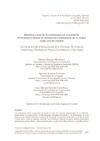Please use this identifier to cite or link to this item:
https://accedacris.ulpgc.es/handle/10553/77661
| Title: | Beneficio social de los ecomuseos en el territorio. El Proyecto Cultural de Desarrollo Comunitario de La Aldea como caso de estudio | Other Titles: | The Social Benefit of Ecomuseums for a Territory: The Cultural Community Development Project of La Aldea as a Case Study | Authors: | Moreno Mendoza, Héctor Santana Talavera, Agustín Parreño Castellano, Juan Manuel |
UNESCO Clasification: | 540402 Geografía rural 550301 Historia local |
Keywords: | Ecomuseo Éxito social Participación Caso de estudio Desarrollo comunitario, et al |
Issue Date: | 2021 | Journal: | Vegueta: Anuario de la Facultad de Geografía e Historia | Abstract: | Los ecomuseos tienen el propósito de poner en valor los recursos patrimoniales de un territorio, promoviendo la conservación y la diferenciación identitaria del mismo y sus poblaciones. Se toma como caso de estudio el Proyecto Cultural de Desarrollo Comunitario de la Aldea en la isla de Gran Canaria (Islas Canarias, España), que entre sus actividades dispone de quince radiales museísticos relacionados con los oficios y labores tradicionales. A partir del análisis realizado, es posible afirmar, por una parte, que el éxito de los ecomuseos está estrechamente vinculado con su aceptación y reconocimiento por las poblaciones que lo albergan y, por otra, que de ese éxito emanan devoluciones a la población en forma de generación y conservación de vínculos sociales e identitarios. The purpose of ecomuseums is to bring to light the value of a territory’s patrimonial resources, promoting the conservation and distinct identity of the territory and its populations. In this article, the Cultural Community Development Project of La Aldea on the island of Gran Canaria (Canary Islands, Spain) is taken as a case study, which numbers among its activities fifteen satellite museums related to traditional trades and tasks. Based on this analysis, it is possible to state that on the one hand, the success of ecomuseums is closely tied to their acceptance and recognition by their host populations, and that on the other hand, this success entails repayment in kind to the population, by way of the generation and conservation of identity and social bonds. |
URI: | https://accedacris.ulpgc.es/handle/10553/77661 | ISSN: | 2341-1112 | DOI: | 10.51349/veg.2021.1.08 | Source: | Vegueta: Anuario de la Facultad de Geografía e Historia [ISSN 1133-598X], v. 21 (1), p. 183-211 |
| Appears in Collections: | Artículos |
Items in accedaCRIS are protected by copyright, with all rights reserved, unless otherwise indicated.
